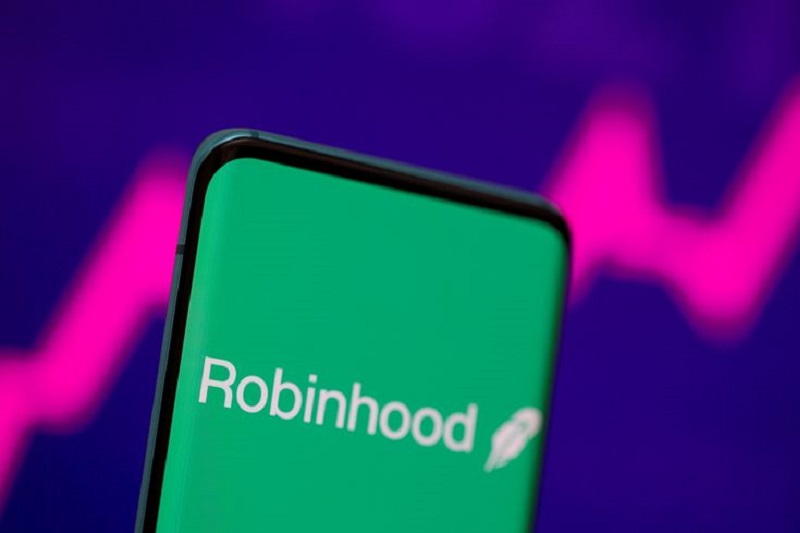S&P 500 falls on pressure from retail stocks, weak jobless claims
(Bloomberg) -- Between record dip-buying and the roller coaster in Robinhood Markets Inc (NASDAQ:HOOD)., the meme-stock army is running wild across Wall Street again -- making life harder for institutional pros trading popular quant strategies.
With amateurs now commanding roughly one-fifth of U.S. equity volume, a cohort of systematic players suspect the retail billions are undermining time-tested trades like short selling and low-volatility investing.
The industry is in better shape compared to the dark days of the pandemic, and quant portfolios are more diversified than those run by human stock pickers. Yet there’s a palpable fear that the Reddit generation is getting powerful enough to disrupt the market patterns underpinning math-powered allocations.
Quants at the likes of UBS Group AG (SIX:UBSG) and Campbell & Company are trying to ride the retail-spurred market waves by incorporating trading activity in their models. But the day-trader penchant for chasing seemingly random companies and moving fast as a herd mean it’s not so easy to divine systematic method in the madness.
“As households start owning more and more equities, there are definitely different patterns in the marketplace,” said Mani Mahjouri, chief investment officer at quant hedge fund Blueshift Asset Management. “The retail investors coming in for whatever reason have a higher utility for risk than typical institutional investors.”
Trading activity from stocks to options surged last year as a new horde of investors flush with stimulus cash signed up for commission-free platforms like Robinhood. While their participation has dipped since the GameStop (NYSE:GME) Inc. frenzy in January, it remains above pre-pandemic levels even as the stimulus check giveaway fades and the stay-at-home era peaks.
To Mahjouri, the retail appetite for volatile names like Tesla (NASDAQ:TSLA) Inc. is contributing to the big underperformance in a popular investing style known as low volatility, which has fallen out of favor in the risk-on reopening. A Dow Jones market-neutral index for the defensive strategy dropped for five straight quarters through June, falling 33% in its worst run of declines in more than a decade.
While quant fund performance has improved this year as a stronger risk appetite buoyed trades like value shares, the worry is whether the Reddit cohort is fueling a lasting change in market patterns.
Take short selling. Received wisdom in quantland has it that short sellers know something others don’t -- and the more willing they are to pay for their bets, the better their information probably is.
Yet a Goldman Sachs (NYSE:GS) basket of the most-shorted U.S. shares has surged like never before to outperform the broader market by 31 percentage points this year. Retail buying of names most-shorted by hedge funds in 2021 like AMC Entertainment (NYSE:AMC) Holdings Inc. and GameStop is upending the once-popular quant trade.
It’s hard to disentangle the many forces driving pandemic trading amid record stimulus, but academic studies have chronicled the growing influence of retail investors in the broader stock market. One suggests herding by the users of trading apps leads to massive returns on the day that subsequently fizzle out. Another paper shows message-board chatter drives retail activity, fuels higher gains and deters shorting -- all in the short-term.
While quants ordinarily seek to exploit behavioral quirks and stock volatility, identifying retail flows in the first place in order to figure out price patterns is a hard task, with brokers among the few directly in the know.
Man Group’s hedge-fund advisory unit in its third-quarter outlook recommended cutting exposure to equity quants tied to a narrow set of strategies, such as those that rely on weird price moves reverting back to normal -- thanks to the random and volatile nature of retail buying and selling.
“Based on historical patterns a quantitative strategy might assume these stock price moves are a deviation from a fundamentally justifiable value,” said Man FRM’s chief investment officer Jens Foehrenbach. “But if the retail flows then keep pushing the price in the same direction, the strategy likely takes losses on this trade.”
That quants are adjusting to meme-stock traders underscores the contingent’s newfound power. Systematic investors tend to run portfolios with a huge array of securities and long-standing risk controls that should shield them from big swings in a handful of stocks. By contrast, discretionary fund managers run a greater risk of having one large exposure roiled by the r/WallStreetBets army.
Social Science
Now, both alpha-chasing quants and human stock pickers are driving a boom in alternative data sets scraping Reddit or Twitter for early signs on the next retail favorite like Sundial Growers (NASDAQ:SNDL) Inc. or Advanced Micro Devices (NASDAQ:AMD) Inc. In a survey with 100 hedge-fund managers overseeing $231 billion conducted by SIGTech, nearly three-quarters said they’ve increased use of data from social media and chat rooms over the past year.
Campbell & Company’s Managing Director of Quant Equities Brian Meloon is among systematic players now incorporating signals on trading activity including likely retail flows to guide a stock-picking model run by the $2 billion quant hedge fund.
Similarly, UBS’s quantitative-investment strategies team recently revamped a stock-momentum product in order to incorporate flows from the bank’s retail market-making desk. The idea is, instead of just chasing the best-performing equities, the UBS offering also tracks the market-moving prowess of the day-trader cohort.
Still, it’s early days yet, with quants only just beginning to grapple with the staying power of the Robinhood crowd.
“Themes such as ‘meme’ stocks and social media have introduced more short-term volatility in certain stock clusters,” said Spyros Mesomeris, head of QIS structuring at UBS. “This reflects the increasing influence and participation of the retail sector in equity markets.”
©2021 Bloomberg L.P.
